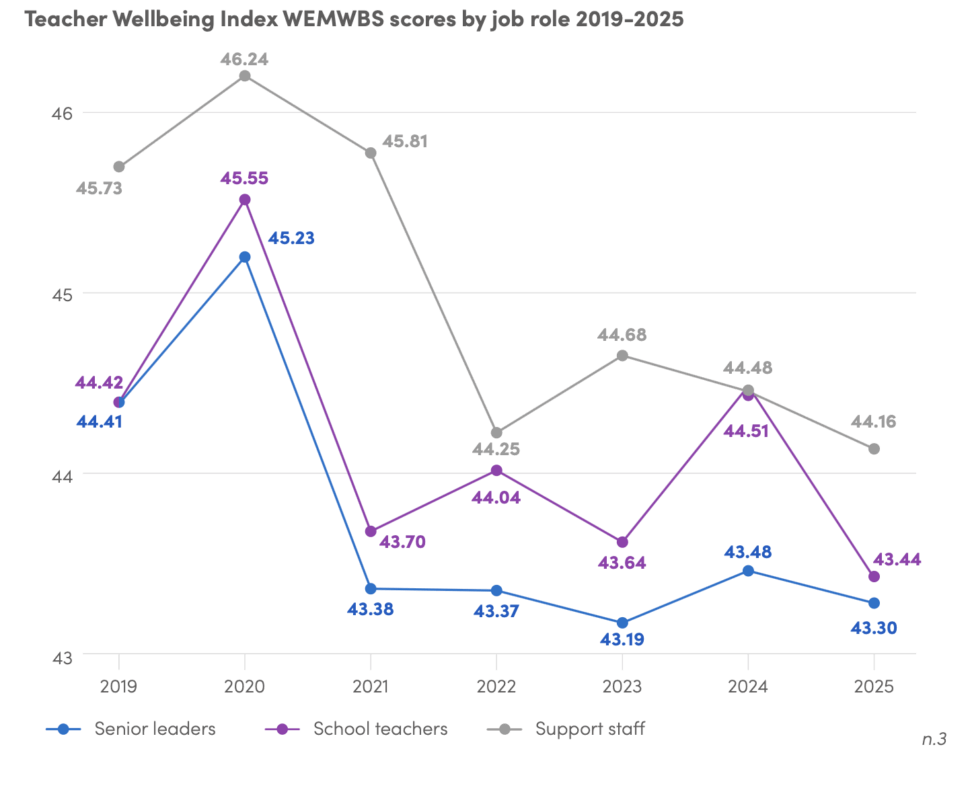Teacher wellbeing rates have dropped to a new low, with more than three quarters of staff experiencing symptoms of poor mental health due to work, a survey has found.
The Teacher Wellbeing Index by Education Support found education staff have continued to report significantly lower wellbeing than the general population after surveying more than 3,000 people in the sector in June and July.
Union leaders have said the findings show a “system in crisis” and warned the workforce is “suffering such enormous damage”.
Education Support has called on the government to develop a dedicated teacher and staff retention strategy and develop interventions to reduce stress and work intensity for school leaders.
Wellbeing at lowest levels
For the seventh consecutive year, education staff reported significantly lower wellbeing than the general population, measured with the Warwick-Edinburgh mental wellbeing scale (WEMWS).
This year, the average wellbeing score for education staff was 43.42. This is lower than the national population score of England, which was 51.40 this year.
In 2019, the first year the index looked at the wellbeing measure through WEMWS, education staff reported an average score of 44.70.
This year, the Index also asked specific questions developed by the Office for National Statistics on mental wellbeing.

It found 76 per cent of education staff report feeling stressed, 77 per cent reported experiencing symptoms of poor mental health due to work, and 36 per cent were at risk of probable clinical depression.
Leaders are most stressed …
School and college leaders reported slightly higher levels of stress (86 per cent) than other roles (76 per cent).
Eighty-one per cent of leaders and 60 per cent of school teachers also said they experienced ‘time poverty’ for three quarters or more of their time – the feeling of having too many things to do without enough time to do them.
… but more teachers consider quitting
But slightly more teachers than senior leaders (29 per cent vs 26 per cent) considered leaving their jobs due to pressures on their mental health.
For 66 per cent of those who have considered leaving, they said volume of workload was the main reason.
Teachers were also more likely to report their organisation’s work culture had a negative effect on their wellbeing, at 51 per cent compared with 45 per cent of senior leaders.
Similarly, 44 per cent of school teachers said they were not well supported by their organisation over their mental health, compared with 35 per cent of senior leaders.
Pandemic and poverty impacts
Seventy per cent of staff reported helping their pupils manage their emotional responses on a weekly basis – up by 31 per cent since before the pandemic.
Some 30 per cent of staff said they provided food for their pupils, while 24 per cent provided key supplies on a weekly basis.
Just under half (49 per cent) of staff who provided this said it had a negative impact on their mental health.
‘System in crisis’
Education Support has recommended the government develop a dedicated teacher and wider staff retention strategy.
Other recommendations include interventions to reduce stress and work intensity for school leaders, and to prioritise suicide awareness.
The report added that despite progress being made to change workplace culture, it has an uneven spread and is undersupported at a national level.

Paul Whiteman, general secretary of school leader’s union NAHT, said: “It is in nobody’s interests for a task so seismically important as nurturing and educating our children and young people to be delivered by a workforce whose health and wellbeing is suffering such enormous damage.”
Whiteman said recruitment targets must be met with “sustained action to invest in schools”, otherwise “it risks being akin to filling a bath without a plug as new and experience teachers continue to leave”.
Labour pledged upon its election to government it would recruit 6,500 more teachers, with details set to be published by December.

General Secretary of the NEU Daniel Kebede added the wellbeing index showed a “system in crisis”.
“Teacher wellbeing must be a workforce priority. Union representatives should be involved in monitoring workload and wellbeing, and schools need adequate funding and staffing. It’s time to redefine teacher support, ensure proper funding, and protect teachers from stress and burnout.”








Lack of funding means more pressure on those in the classroom. Whilst SLT are just as overwhelmed and under pressure, it means their ability to support and recognise the needs of their staff is zero. Hence it becomes worse and people leave.